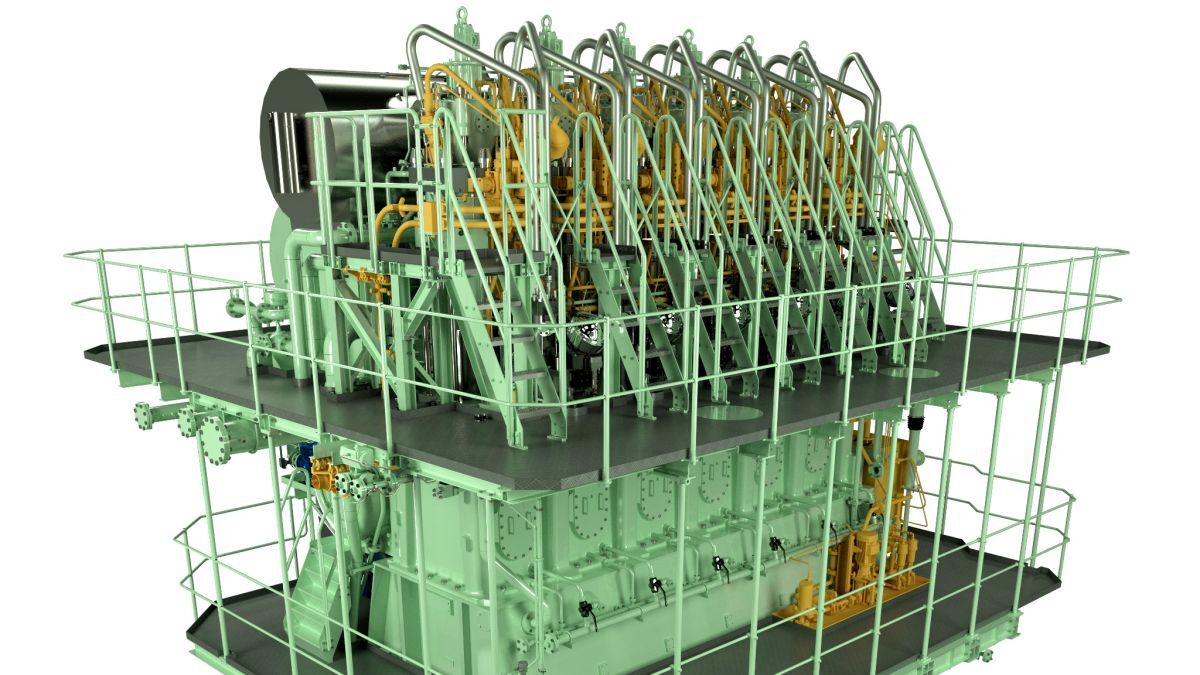 MAN Energy Solutions’ two-stroke, methanol dual-fuel engines are a mature engine technology, with 120,000 running hours (source: MAN ES)
MAN Energy Solutions’ two-stroke, methanol dual-fuel engines are a mature engine technology, with 120,000 running hours (source: MAN ES)
Mature two-stroke engine technology and e-methanol supply deals underpin large newbuild orders by Maersk and X-Press Feeders
When considering methanol as an alternative fuel, MAN Energy Solutions two-stroke promotion and customer support head, Thomas S Hansen, thinks shipowners should take three key points into consideration.
“First, the technology is ready, and it’s available,” he says, highlighting methanol-fuelled, two-stroke engines have been in service since 2016, and there are now 40 vessels operating on the technology. MAN Energy Solutions’ two-stroke, methanol dual-fuel engines have 120,000 hours of operation. “Second,” he says, “the solution can provide 100% carbon neutrality using biomethanol or Power-to-X -based methanol. And third, the solution is scalable. It means that you can start your operation on very low-sulfur fuel oil and then gradually shift to methanol as it becomes available for you.”
While the two-stroke, Diesel-cycle engine technology has been available for almost six years, it was not until last year that methanol as a marine fuel started to gain momentum. This was thanks in a large part of AP Moller-Maersk, which first placed an order for the construction of a methanol dual-fuelled, 2,100-TEU feeder ship. Under construction to ABS class at Hyundai Mipo Dockyards in South Korea, the ship’s dual-engine technology enables it to sail on either methanol, biofuels or very low-sulphur fuel oil (VLSFO). The dual-fuel, low-speed, two-stroke MAN 6G50-LGIM main engine will be developed by MAN Energy Solutions and Hyundai Engine and Machinery, with methanol-capable auxiliary gensets by HiMSEN, in collaboration with the shipbuilder and Maersk. The ambition is to operate the feeder ship on green methanol when it becomes available to obtain carbon-neutrality. Maersk plans to take delivery of the ship in 2023.
Maersk followed its initial order by signing a shipbuilding contract to build eight 16,200-TEU container ships, then exercising an option to build four more in 2022. All of these ships will have MAN Energy Solutions methanol, dual-fuel LGIM engine technology.
“If we consider using green methanol or biomethanol, it will be a 90% to 95% reduction in CO2 emissions”
Speaking at a recent webinar on methanol-fuelled engine developments, Mr Hansen says the interest in methanol goes beyond the container ship segment, and includes bulk carriers, tankers, roros and PCTCs.
When it comes to future fuels, MAN Energy Solutions is fuel agnostic. Its role is to support shipowner demands by developing engine technology. As a result, over the last decade, MAN Energy Solutions’ family of two-stroke engines has been growing to meet customer demands for engines that burn methane, ethane, LPG and methanol, as well as traditional liquid marine fuels. “By 2024, we will also have an ammonia-powered engine,” notes Mr Hansen. “Today, we have more than 670 dual-fuel engines on order or in service. So, I think it is fair to say that we have really succeeded with our concept of future-proofing engines with the dual-fuel options.”
X-Press Feeders orders eight box ships
The orders for methanol dual-fuel vessels grew further in late 2021 with the confirmation by Singapore’s X-Press Feeders for eight 1,170-TEU container ships, with deliveries in 2023 and 2024. Designed by Hamburg-based naval architects Technolog Services GmbH, the box ships will be operated by X-Press Feeders on its Europe and Americas trade routes.
As a result of the increased interest in methanol, MAN Energy Solutions is expanding its engine portfolio to serve the segment with S60ME-C, G60ME-C and G70ME-C versions, providing a choice between seven engines and five bore sizes designed for methanol operation. The first two 60-bore engines are set for release in Q2 2024. No schedule is yet set for the G70ME-C engine.
“One of the 16,200-TEU container ships being built by Maersk will require 44,280 tonnes of methanol per year”
Examining the alternative fuel’s emissions, MAN Energy Solutions director of two-stroke promotion Kjeld Aabo says: “[Operating on] the methanol which is available today, compared to a heavy fuel oil, we will have a reduction of 30% to 50% in NOx, 90% to 97% in SOx, 90% in particulates and 10% in CO2.” Mr Aabo points out that when e-methanol and biofuels become more readily available the future for the alternative fuel becomes even brighter. “If we consider [using] green methanol or biomethanol … it will be 90% to 95% reduction in CO2 emissions, with the rest [from] pilot oil.” He adds if biofuel is used as the pilot oil in the future, “then actually we will have 100% CO2-neutral engine.”
Of course, the success of any future alternative fuel will be predicated on several factors, not the least of which is the ready availability of the fuel itself.
As an example, Mr Aabo estimated one of the 16,200-TEU container ships being built by Maersk will require 44,280 tonnes of methanol per year, based on a 50% load and operating 270 days annually.





